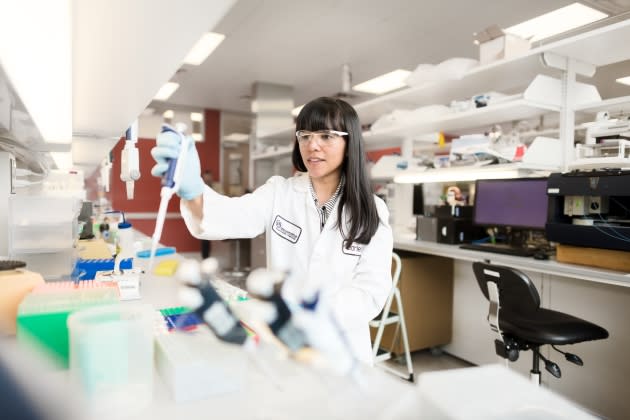Unilever, Geno Aim to Develop Biotech Solutions That Lather, Lift Dirt

LONDON — Unilever is making its largest investment in palm alternatives to date, teaming with the California-based company Genomatica on developing greener ingredients for home cleaning and personal care products.
Unilever and Genomatica, known as Geno, will on Thursday reveal the creation of a $120 million venture to commercialize and scale alternatives to palm oil and fossil fuel-derived ingredients.
More from WWD
The aim of the venture is to offer plant-based, sustainable and “highly effective alternatives” to the home and personal care markets, which have a combined value of $625 billion.
Unilever, parent of around 400 brands including Dove, Domestos, Love Beauty & Planet, and The Vegetarian Butcher, is the first corporate backer of the venture, with other strategic investors expected to join.
According to Unilever and Geno, the challenge is to develop a plant-based surfactant, or cleaning agent, that can lather and lift dirt. Surfactants are the key ingredients in shampoo, body wash, and soap. Most surfactants right now are made using either palm kernel oil derivatives or petrochemical sources.
“At present, there are few viable alternatives to palm and fossil sources that can be produced at scale to make those ingredients,” said Unilever, adding that the partnership with Geno marked its largest investment so far in developing biotechnology alternatives to palm oil.
Geno said it has spent decades using biotechnology to develop and scale sustainable materials derived from plant- or waste-based feedstocks. It converts plants and waste into chemical building blocks that go into cosmetics, carpets, home cleaners, and apparel.
Among the companies it has worked with is Lululemon Athletica.
Geno believes that the products it develops could also potentially help companies reduce their carbon footprint by up to 50 percent.
Unilever’s chief R&D officer Richard Slater said that biotechnology has the potential to “revolutionize the sourcing of our cleansing ingredients and ensure that Unilever is a future-fit business.”
He said the new venture with Geno “will sit at the intersection of science and sustainability, meaning we can continue to grow our business without relying only on palm oil or fossil fuel derivatives.”
Slater added that developing new materials will also help to make Unilever’s supply chains more resilient. “We will be marrying science and nature to make sure there is no trade-off for our consumers between the efficacy and sustainability of their products.”
He told WWD that, in the past biotechnology alternatives have shown promise “but they’ve not been at the stage where we can scale and commercialize. Thanks to advances in biology, engineering and — importantly — digital technology, we are now at this stage. We’re moving from trial-and-error physical experiments to using data, virtual modeling, and AI to dramatically speed the process and improve the chance of success at commercial scale.”
In terms of timing, he said the plan is to run trials over the next few years, with the intention of scaling up production for use in products between 2026-28.
Slater said they’re using sugar as the main feedstock, which goes through a fermentation process.
“As we progress, we’d like to make this process even more sustainable by using the parts of crops that don’t currently make it into the supply chain — like the waste corn stubble that’s left in a field after a harvest. Lifecycle analysis shows that this is a lower carbon alternative. This will mean we can use feedstocks that are close to future production hubs, shortening freight distances too,” he added.
Christophe Schilling, Geno’s chief executive officer, said his company has proven “that biotechnology can replace traditional production methods to produce ingredients with bio-based sources that deliver both high-performance and sustainability, at scale. Our Geno technology also represents the potential to reduce greenhouse gas emissions by 100 million tons in upcoming years.”
Unilever, which had sales of 52.4 billion euros last year, has repeatedly said it wants to be a purpose-driven organization and a global leader in sustainable business. More than half of the company’s footprint is in developing and emerging markets.
The company said that while sustainably sourced palm oil will remain an important source of bioenergy, alternative ingredients can play a growing role in diversifying supply chains to drive optionality, sustainability, and cost management.
Sign up for WWD's Newsletter. For the latest news, follow us on Twitter, Facebook, and Instagram.

